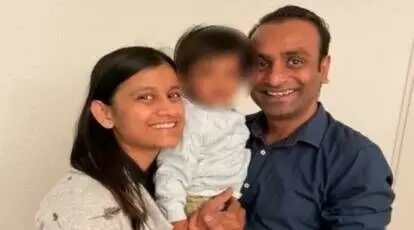
German court rejects Indian parents' custody pleas in Ariha case; grants child to local agency
text_fieldsAhmedabad: In two rulings dated June 13, a district court in Pankow, Germany, refused custody of Ariha Shah, a 28-month-old girl, to her biological parents and instead gave her to Jugendamt, the country's youth services.
The court granted Jugendamt custody of Ariha after rejecting Dhara and Bhavesh Shah's request to have the child returned to them or at the very least given to a third party, the Indian Welfare Services. The court also ordered that Jugendamt shall be the child's legal guardian and ruled that “the parents are no longer authorised to decide on the whereabouts of their child”.
On June 3, Ministry of External Affairs spokesperson Arindam Bagchi urged the German authorities “to do all that is necessary to send Ariha to India at the earliest, which is also her inalienable right as an Indian national”. In a letter to the German ambassador to India, Philipp Ackermann, earlier in June, 59 members of parliament from 19 political parties—including the BJP, Congress, the Left, and Trinamool Congress—asked him to do everything in his power to guarantee Ariha's prompt return to India, Indian Express reported.
Court-appointed Central Youth Welfare Office of Berlin will make decisions regarding Ariha's whereabouts as her provisional guardian. The parents had first asked for custody of Ariha but had now dropped their plea. They then asked that full parental custody be restored and that the child be handed over to Indian Welfare Services, with the understanding that she would thereafter be sent to an Ashok Jain-run foster home in Ahmedabad. Along with her, the parents intended to relocate to India.
The court cited two injuries Ariha had sustained: a head and back injury in April 2021 that occurred while she was being washed and a genital injury in September 2021—in refusing custody to Ariha's parents or the Indian Welfare Services. In order to "avert the existing danger to the child," the court justified denying parental care. The court stated that it had come to the conviction “that the mother and/or father (had) intentionally caused the serious genital injuries of the child” and that the parents were unable to “explain the events in question in a sufficiently consistent manner”.
The district court also ruled that the parents already have “the right and duty” for visitation twice a month “on the first and third Tuesday of each month for 60 minutes (of) accompanied contact”. They had requested accompanied visitation with their daughter once every two days for 90 minutes in their visitation petition. The court denied their plea, stating that maintaining contact with Ariha's parents was necessary for her to be able to establish a consistent image of them as she developed, “on the other hand, the development of a bond was no longer in the foreground”. It also noted that the contact frequency should not be changed so as to “not cause any additional irritations in the child’s experience”. The court decision stated that Ariha should be given time to develop a bond with her foster parents and that any change in visitation frequency or duration could have "a disturbing effect" on the child.
Following the verdict, Ariha's parents flew from Berlin to New Delhi on June 15 to request the Indian government for Ariha to be returned home as she is an Indian citizen. “We plan to appeal in a higher court in Germany but have little hope of getting a fair trial. We were expecting a verdict like this. They did not opine on the reports of experts who defended us, and just gave a one-sided verdict,” says Bhavesh.
The couple has asked the MEA to repatriate Ariha on their behalf. They claimed to be unsure of the Jugendamt's intentions regarding visits after Ariha turns 3 years old. Dhara added, “And once we lose visitation, if we want to bring her back to India, Ariha herself may not remember us or understand what India is and may refuse to come back. The visitation that has been allowed now is supposed to apply until Ariha settles in with her new foster parents.”
Ariha, who was born in February 2021, was only seven months old when the Jugendamt took her into custody following a private parts injury. Her parents took her to a hospital. Youth services were informed after her treatment. Ariha's parents were accused of harassing her by the German government. Bhavesh claimed that the hospital had ruled out the harassment in December 2021 and that the prosecution had dismissed all charges in connection with it in February 2022.
Speaking to the media on June 8, Bhavesh said, “Our visitations with Ariha since October 2021 were supervised by a social worker. We constantly received good reports from the social worker. As of September 2022, the social worker observed that the visitations were going well and that they may be increased. Relying on those reports, in September 2022, we went to the family court requesting that the frequency of our visitations should be increased to at least twice a week, but Jugendamt opposed the plea.”
He added, “Ultimately, the judge, taking the middle ground, directed bimonthly visitations — on the first and third Tuesdays — for an hour each. However, we learnt that Jugendamt had not informed the social worker about the court order and without these instructions, the social worker could not change our visitations. We started talking to the Indian Embassy. Finally, after communication between the Embassy and Jugendamt, the court-ordered bimonthly visitations were implemented in December 2022.”























